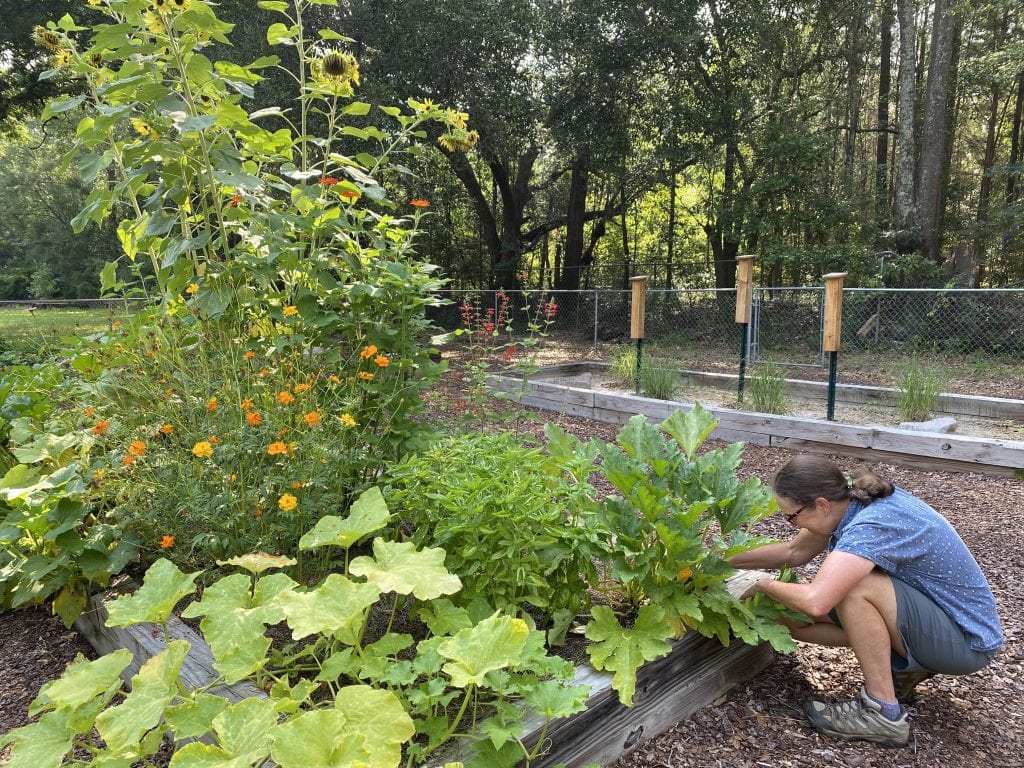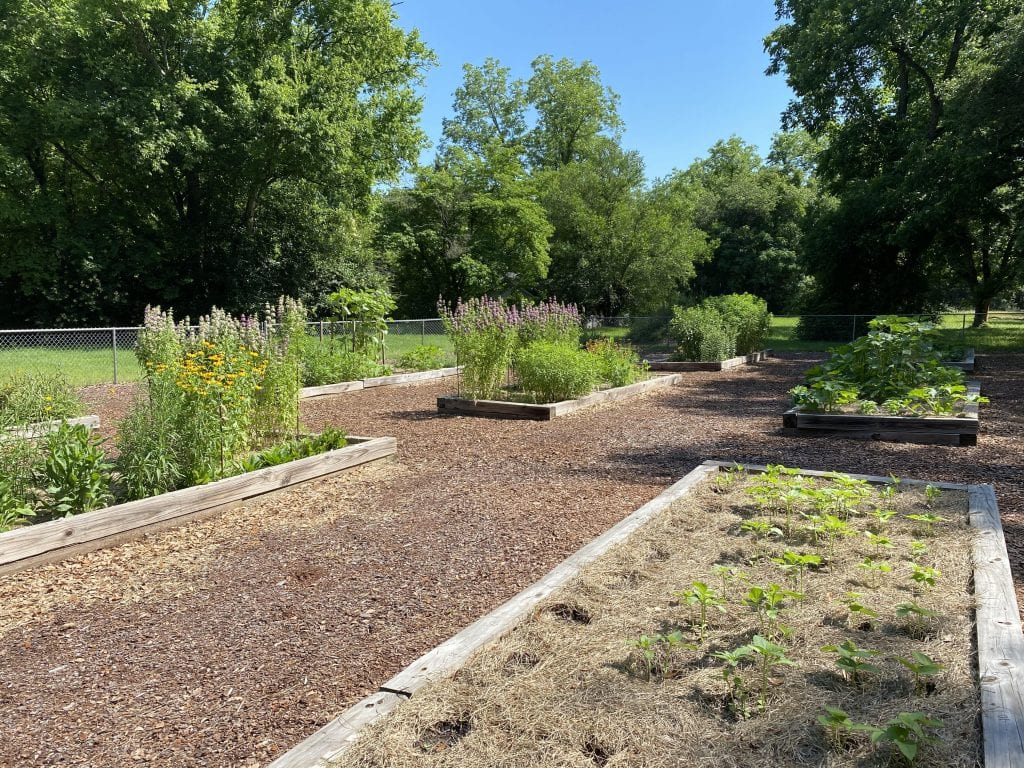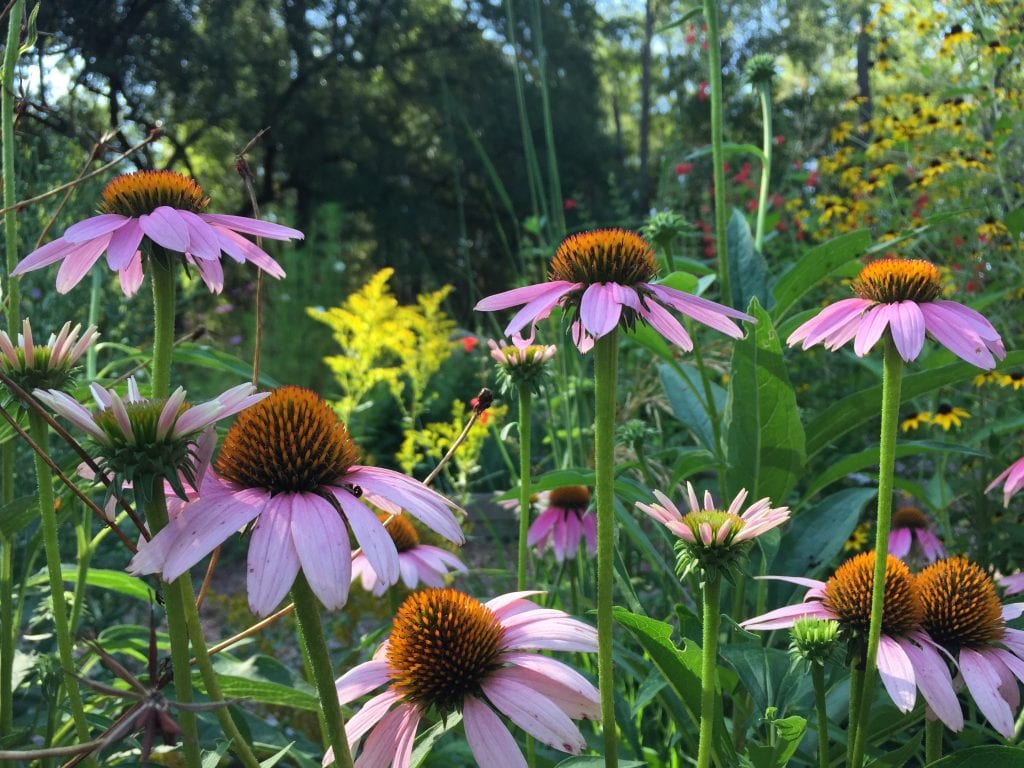Conservation project aims to ‘BEE-friend Local Pollinators’
July 29, 2020A federal grant worth nearly $30,000 will help an area in Southeast Richland bloom into a teaching initiative for pollinator conservation, and residents can learn lessons from the garden through an online video series starting in August.
The initiative, “BEE-friend Local Pollinators,” refers to the key role of pollinators in the life cycle of many flowering plants. By carrying pollen from flower to flower, animals such as bees, butterflies, birds and bats enable plants to produce seeds. In turn, these seeds allow for new generations of plants to grow.

Anne Marie Johnson, pollinator garden manager, tends to Richland County’s pollinator garden and demonstration area.
The $29,287 Urban Agriculture Conservation Grant will help rehabilitate, expand and maintain an existing demonstration area at Pinewood Lake Park, which remains closed to the public because of COVID-19. While the park is not accessible, lessons from the garden are. The Richland Soil and Water Conservation District (SWCD) will use the area to provide technical assistance with pollinator conservation to educators, small farmers, and home and community gardeners.
Residents are encouraged to participate in outreach efforts hosted online as part of the new Engage Richland “Watch and Learn” video series. The Watch and Learn series starts Wednesday, Aug. 5 on the County’s YouTube page. Videos featuring the garden will include webinars and virtual tours.

Richland County’s new pollinator garden and demonstration area includes 12 raised garden beds and will be used to provide technical assistance with pollinator conservation to educators, small farmers, and home and community gardeners.
While pollinating animals are critical to agriculture in South Carolina, said Richland SWCD Chairman Kenny Mullis, “Pollinators are facing many challenges, including habitat loss. We hope our work can help educate the community about the importance of pollinators and showcase things we can do in our own home and community gardens to support pollinator health.”
The pollinator demonstration area includes 12 raised garden beds and is managed by the Richland County Conservation Commission. As part of the County’s initiative, some of the beds will be planted with annual vegetables and small fruits that depend on pollinators for survival, while others will be designed to provide habitat for pollinators.

Some beds at the County’s pollinator garden are designed to provide habitat for pollinators, while others are planted with annual vegetables and small fruits that depend on pollinators for survival.
“This garden will model plant selection and maintenance practices that encourage pollinators,” said Anne Marie Johnson, pollinator garden manager.
The Richland SWCD was awarded the grant through a partnership with the National Association of Conservation Districts (NACD) and the U.S. Department of Agriculture’s Natural Resources Conservation Service. Nationwide, 21 conservation districts received funding through the Urban Agriculture Conservation Grant Initiative.
Go online to learn more about the Richland SWCD’s project, as well as other recipients of the NACD 2020 Urban Agriculture Conservation Grant. Contact Education Program Coordinator Chanda Cooper at [email protected] for more information.
The National Association of Conservation Districts is the nonprofit organization representing the nation’s 3,000 conservation districts, their state associations and the 17,000 men and women who serve on their governing boards. For more than 70 years, local conservation districts have worked with cooperating landowners and managers of private working lands to help them plan and apply effective conservation practices. For more information about NACD, visit www.nacdnet.org. Conservation districts are political subdivisions of state government under the local direction of five-member boards of commissioners. In South Carolina, conservation district boundaries conform to county boundaries. The Richland Soil and Water Conservation District promotes the wise use and care of natural resources for long-term sustainability













